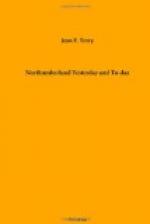“Thus have I rumoured through the
peasant towns,
Between the royal field of Shrewsbury
And this worm-eaten hold of ragged stone,
Where Hotspur’s father, old Northumberland,
Lies crafty-sick.”
Two years after this, the castle was besieged by Henry IV. himself, and surrendered to him after a brief bombardment by the newly invented cannon. The keep was re-built by Hotspur’s son, after the family possessions had been restored to him by Henry V., and it is now the only remaining part of the castle which is almost perfect. One of the half-ruinous towers remaining is called the Lion Tower, from the sculptured lion on its walls; while another rejoices in the curious name of Cradyfargus. A strange story is told of a blue stone to be seen in the courtyard of the castle. Many years ago, so runs the tale, one of the custodians of Warkworth Castle dreamed three nights in succession that a large treasure was concealed beneath a blue stone in a certain part of the castle grounds. He told this dream to a neighbour, and after allowing two or three days to pass, finding the dream constantly recurring to his mind, he thought he would go to the place indicated, and see what he could find. To his disappointment, however, he discovered that some one had been there before him; a large hole had been dug, and on the edge of it lay the blue stone.
Needless to say, the hole was empty, nor could the keeper discover anything about the treasure in the neighbourhood. It is said that a certain family in the village became suddenly rich; and, many years afterwards, a large and ancient pot, supposed to have been that in which the buried treasure had been contained, was found in the Coquet.
The main street of Warkworth leads straight up to the postern gate of the castle, and many stirring sights have the successive inhabitants of the little village looked upon, as the fortunes of the owners of the castle waxed and waned throughout the many centuries in which the lords of Warkworth played a notable part in the history of England. They saw Henry Percy, entrusted with a share in the safe keeping of the country, set out from Warkworth for Durham, to help in winning the victory of Neville’s Cross.
They saw Hotspur’s force set out for the Cheviots to intercept Douglas and his followers, which they did at Homildon Hill, near Wooler; and it was the quarrel in connection with the prisoners taken on that day which led Hotspur and his father openly to throw off their allegiance to Henry IV., so that a few months later the peasants of Warkworth saw their idolised young lord set out for what was to prove the fatal field of Shrewsbury. They saw Hotspur’s father, the first Henry Percy to receive the title of Earl, (a title which had been given him at the coronation of Richard II.) set out with a brave force after Hotspur’s departure; and they saw his return, almost alone, dejected and broken in spirit, having learnt that the help so tardily given had come too late, and the life of his gallant son was ended.




